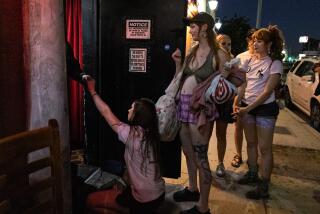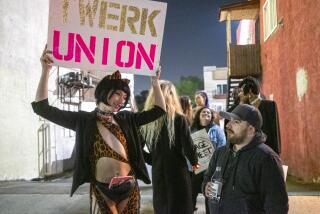Rotary International to Reinstate Rebel Club With Female Members
- Share via
The Duarte Ex-Rotary Club can take the “ex” out of its name, at least temporarily.
Rotary International has complied with a court order to reinstate the Duarte club, which was expelled in 1978 for allowing women to join in violation of by-laws limiting membership to men.
The club was reinstated pending the outcome of an appeal to the U.S. Supreme Court over whether clubs should be permitted to admit women.
Wait and See
“We are happy at the victory, but we are waiting to see what kind of a welcome we will get from International,” said Sylvia Whitlock, vice president of the club and one of the 12 women among the 24 members.
“We have talked about putting an X through the ‘Ex’ in our name,” but since we have not yet been notified officially we are putting that on hold.”
Sarah Martin, a former president of the club, said she views the reinstatement with mixed feelings.
“We have been working for eight years to achieve this, so I am delighted that we accomplished what we set out to do,” she said.
Unhappy With Bias
“Rotary International is an institution I felt good about, but I am not pleased with their discrimination,” she said, adding that she thought local clubs should have the option to admit women.
The Duarte club will be treated like any Rotary Club, said Jack Giles, public relations director for Rotary International. But he added that the club is being reinstated only because of the court order.
“I don’t know how long this situation will remain,” said Giles. “It depends on if the Supreme Court decides to hear our appeal and if so, when the court will rule.”
After the Duarte group was expelled in 1978, it filed suit in Los Angeles Superior Court, where Judge Max Deutz refused to reinstate the club.
The Duarte group appealed, and a state appeals court last March reversed Deutz, saying that Rotary clubs are business establishments subject to regulation under the state’s Unruh Act, which bans discrimination based on race, sex, religion or ethnic origin.
Rotary International then appealed to the state Supreme Court. When that court refused to hear the case, Rotary International petitioned the U.S. Supreme Court.
In the meantime, the organization was unsuccessful in stopping implementation of the lower-court decision ordering reinstatement of the local club pending the outcome of the appeal.
So until the Supreme Court reaches a decision, California Rotary clubs have the option of admitting women members.
Should Make Own Rules
“We are appealing to the Supreme Court because the board of directors still feels the association is private,” Giles said. “As a private club we disagree with the decision that we are public. We should be making our own rules.”
And if the Supreme Court ultimately should rule in favor of Rotary International, the local club again would become the Duarte Ex-Rotary Club.
“It is unfortunate that there may be confusion in the future,” Giles said. “There is a potential for embarrassment, and it would be regrettable for the individuals involved. It is a difficult situation and one I wish could have been avoided.”
The Duarte club decided to accept women as members in 1977 because of dwindling membership. At that time the club had only seven or eight active members, said Richard Key, who was president then. Because the club could not enroll enough men, the members voted unanimously to admit women and invited three to join.
Within a year the club had doubled its membership and became the largest and most active service club in Duarte.
After it lost its charter and failed in an attempt to persuade Rotary International to change the by-laws limiting membership to men, the club decided to continue as an independent organization.
More to Read
Sign up for Essential California
The most important California stories and recommendations in your inbox every morning.
You may occasionally receive promotional content from the Los Angeles Times.













